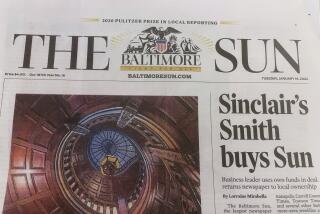Zell firm’s point man is believer in paper profits
- Share via
All the Pate children remember the long days of their youth, writing stories, running the printing press or selling newspapers for the Madill Record in Oklahoma.
The tiny weekly was a pillar of the community in Madill, an oil-and-ag town of 3,400, so respected that two generations of Pates landed in the Oklahoma Press Hall of Fame. A 1990 plane crash killed the last Pate to publish the Record, effectively ending the family’s local newspaper legacy.
Now Bill Pate, the youngest member of the third generation, is on the verge of returning to the newspaper business, and in a big way. He was a key player as the Chicago firm led by billionaire Sam Zell planned to take Tribune Co. private in an $8.2-billion deal.
On Wednesday, Zell joined the board of Tribune, owner of the Los Angeles Times and the third-biggest U.S. newspaper chain by circulation. Pate is expected to join later this year.
Pate, Zell and their colleagues at Equity Group Investments have been surprised by the attention the planned transaction has generated, considering that Equity Group has completed deals worth a whole lot more. On the other hand, none of those involved marquee holdings like The Times, the Chicago Tribune and the Chicago Cubs.
“This is a risky deal,” Pate said last week. “If we stumble on this investment, this will mark Sam’s career.”
Much of the risk will be in the $8.4 billion in fresh debt that will be heaped on Tribune when newspaper advertising revenue is shrinking. Pate, Equity’s chief investment officer, said he thought the company could carry that load if all else went well.
“The bigger concern is finding ways to grow the top line,” he said. “We have to find more revenue.”
In meetings at The Times’ offices last week, Pate predicted the new leadership would be less formal, skeptical of using staff reductions to increase profit and aggressive about finding ways to extract money from Internet portals that rely heavily on newspaper content.
Equity Group’s confidence in the future of newspapers bucks conventional wisdom, Pate acknowledged. The 43-year-old executive thinks the challenges confronting papers, though real, have been exaggerated.
“Newspapers have been popular and profitable for quite some time,” he said, “and we think they will continue to be for quite some time.”
Given his roots, Pate’s belief in the business might come as no surprise.
His father and grandfather operated the Madill Record and printed many other small papers at their plant, about an hour and a half north of Dallas.
The Record hasn’t changed much since those days. This week’s front page featured a story on the new decorative clock outside the town’s community center, a piece on the upcoming meeting of the ministers’ alliance and -- the closest thing to “breaking” news -- a story on lambs killed by a pack of stray dogs.
(Close readers of the sports page might also note that the Madill High Wildcats just broke the 4-by-800-meter relay record set 26 years ago by a team that included one Bill Pate.)
In those days, Pate’s mother penned a front-page column called Maribeth’s Meanderings. He recalled that his grandfather’s columns, “in their own small way, set the tone for this community.”
Several family members never strayed far from the news business. Pate’s older sister, Marti Gallardo, is the top classified advertising executive at the Wall Street Journal. Some of his cousins have published small papers.
Older brother Herb probably still would be at the helm of the Record had a plane crash in an Oklahoma field not taken his life 17 years ago. That tragedy led the Pates to sell the Record to a family friend.
Bill Pate said he had “an appreciation for journalism and what journalists do” but tends to be modest about his newspaper roots when meeting employees at Tribune.
“In some ways, these small town weekly papers are as much like a big city daily as the grocery business is like the newspaper business,” he said. “It’s a very different world.”
Pate left Oklahoma for Harvard, where he co-captained the track team and ran a 4:09 mile. He graduated magna cum laude and went to work as a financial analyst at a New York investment bank before joining private equity giant the Blackstone Group.
Pate and wife Kathe didn’t want to raise their children in New York so they moved to Chicago, where both entered University of Chicago Law School. He graduated with honors and, not long after, was introduced to Zell. Pate clicked with the investment guru, who built a fortune now estimated at $4.5 billion, mostly on commercial real estate.
Over 13 years, Pate has risen to become the top investment officer for Zell’s non-real estate investments. Among the companies he has helped oversee is Covanta Energy Corp., a New Jersey-based trash-to-energy concern. Partly through acquisitions, Covanta’s sales have grown from $531 million to nearly $1.3 billion in three years.
Covanta Chief Executive Anthony Orlando said Pate “has just a voracious ability to consume information and understand. He has a very good intuitive and analytical business sense.”
Pate has drawn similar reviews in his initial forays inside Tribune. “Bill and these other guys were thoughtful and trying to learn. They didn’t come in with a lot of swagger,” a Tribune executive said. “Not that some of their questions didn’t make you uncomfortable.”
Pate said one of his key goals would be quelling the rivalry between Tribune and its largest business unit, The Times, which Tribune acquired in 2000. Two publishers and two editors left the newspaper in less than two years, as Times executives accused Tribune of cutting the news staff excessively.
Pate said that The Times -- and Tribune’s 10 other newspapers and 23 television stations -- could expect more autonomy when Zell took over, along with his firm’s partner, a new employee stock ownership plan.
The business units will become like petri dishes, primed for experimentation, Pate told Times editors.
He added: “We’ll see if you’ll make penicillin or mold.”
*
More to Read
Inside the business of entertainment
The Wide Shot brings you news, analysis and insights on everything from streaming wars to production — and what it all means for the future.
You may occasionally receive promotional content from the Los Angeles Times.











